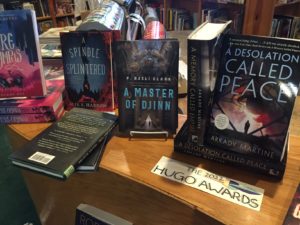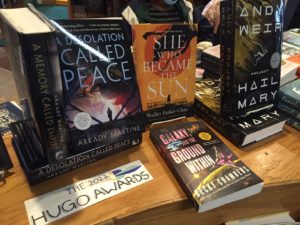What an exciting bunch of finalists! I’ve read precisely none of the finalists in the first four fiction categories (I had put The Witness for the Dead by Katherine Addison on my nominating ballot and am sorry to see it was not among the top six), also none of the finalists for Best Related Work, and only parts of the finalists in Best Series. So I am looking forward to some great reading between now and the time voting closes, from a mix of authors whose work is familiar to me and entirely new to me.
Best Related Work is back to being mostly non-fiction books, after a couple of years when miscellany dominated. Last year I was very pleased with the winner, but I also had three works below No Award, mainly because I do not think that a convention is a related work. The one finalist that isn’t book-length is a substantial article in a mainstream publication about the fall-out from what became known as “Helicopter Story” by Isabel Fall. It’s ironic that another finalist this year (Dangerous Visions and New Worlds: Radical Science Fiction, 1950 to 1985, edited by Andrew Nette and Iain McIntyre) is about dangerous visions in the history of science fiction. The field got to see the real thing with “Helicopter Story,” and did not cover itself with glory. Those two are the works I’m most looking forward to reading. I’ve read a couple of blog entries in the series that became The Complete Debarkle, and while I’m glad this history exists in compiled form, I have the sense that it will be more than complete for me. I don’t know anything more than the titles and authors of the other three (Being Seen: One Deafblind Woman’s Fight to End Ableism by Elsa Sjunneson; Never Say You Can’t Survive by Charlie Jane Anders; True Believer: The Rise and Fall of Stan Lee by Abraham Riesman), so I am looking forward to finding out more.
Best Short Story has one story I almost read (“The Sin of America” by Catherynne M. Valente), two by authors I’ve read before (“Where Oaken Hearts Do Gather” by Sarah Pinsker and “Tangles” by Seanan McGuire), and three by authors who are, or rather were, new to me: “Mr. Death” by Alix E. Harrow; “Proof by Induction” by José Pablo Iriarte; and “Unknown Number” by Blue Neustifter. Since the nominations were announced, I’ve read “Unknown Number,” and it’s neat. It’s a story told in the form of an exchange of text messages, and it was first published as a thread on Twitter. The place of publication is something of a novelty, whereas the form is necessary for the story.
Best Novelette has another nominee by Catherynne M. Valente, “L’Esprit de L’Escalier.” She has a third in Novella. Seanan McGuire has three nominations in 2022 as well. Looking in just the fiction categories, three or more nominations in a single year is an exceptional feat, and to date Seanan McGuire has managed it the most. She had four in 2014 and three in three other years. Michael Swanwick had four in 2003 and three in 1999, making him the only person to have accomplished the feat in two different centuries. 1999 was also the only other year (I think) when two authors had three nominations; Bruce Sterling was the other one that year. Charles Stross had three in 2005. In 2012, he and Valente shared what I think is a unique feat: separate Hugo finalists that had the same title. In addition to McGuire and Swanwick, Robert Silverberg is the only other person to have been a finalist in three categories in more than one year, 1970 and 1973. The only other person to be a three-time finalist in a single year during the 1970s was Larry Niven in 1976. In the 1980s, nobody was. I’ve not read anything by any of the other finalists in Best Novelette this year; lots to learn!
Best Novella brings authors I have read, if not these works. Aliette de Bodard (Fireheart Tiger), Becky Chambers (A Psalm for the Wild-Built), Alix E. Harrow (A Spindle Splintered), Seanan McGuire (Across the Green Grass Fields), and Catherynne M. Valente (The Past Is Red) have all been reviewed here at Frumious. Adrian Tchaikovsky (Elder Race) will be a newcomer to our pages.
In Best Series, one of the other finalists will really have to knock my socks off to overcome my preference for Terra Ignota by Ada Palmer. The series is hugely ambitious, succeeds in the first half (I haven’t yet read the second half), and is complete. That seems to me the kind of work that Best Series was designed to recognize, and barring a surprise it’s the one I expect to rank first on my ballot. I’m keen to find out more about The World of the White Rat by T. Kingfisher. Knowing nothing else about it, I would not mind at all if it wins because the world needs more Ursula Vernon Hugo acceptance speeches. I read the first instance of Merchant Princes by Charles Stross but haven’t felt called to read the more recent version. So far, anyway. I enjoyed them until he got bored with them in the last book, or maybe book and a half. Both Doreen and I have reviewed large swathes of the Wayward Children series, and it’s a known quantity to me by now, so where it falls on my ballot will depend on how I react to the other finalists. Those are The Green Bone Saga by Fonda Lee and The Kingston Cycle by C. L. Polk, and that is all that I know about them at present.
Among the Best Novel finalists, I’ve not read anything by Ryka Aoki (Light From Uncommon Stars) or Shelley Parker-Chan (She Who Became the Sun). I’ve not read Project Hail Mary by Andy Weir, but I read and liked The Martian. I’m glad to see a book of this sort among the finalists, though I have no idea if it’s as enjoyable as The Martian. Doreen has written about A Master of Djinn by P. Djèlí Clark, and we’ve both written about his previous Hugo finalists, along with some of his other works. I’ve liked them all and am excited to read this one. Becky Chambers (The Galaxy, and the Ground Within) and Arkady Martine (A Desolation Called Peace) round out the finalists in this category. They’re both known quantities whose work I like well enough but who don’t completely hit the sweet spot for me, but who knows? They’re both capable of surprising with the quality of their novels.
This is an unusual year for me in that I’ve already seen half of the finalists in Best Dramatic Presentation, Long Form and already had plans to see at least one more. My views about most of the rest of the categories will largely depend on what, if anything, the finalists put into the voters’ packet. I wish the finalists in Best Semiprozine would decide who represents the collective work involved. I continue to be surprised at the small number of votes at the nominating stage it takes to become a finalist in some categories, but then I don’t know the field well enough to make additional suggestions.
The Hugo awards will be presented at Chicon 8, the 80th World Science Fiction Convention, taking place in Chicago September 1–5 this year.


